The central premise of Quakerism is that the light of God exists within all people without exception or prejudice and cannot be stolen, extinguished or even diminished. I attended a Quaker secondary school and suffered through hours and hours of mandatory silent reflection on this. It wasn’t until my daughter was born that I started to think about it more closely and understood the idea of an eternal flame in a new way. At the moment of her birth, new love had erupted into being, a new flame, and it took nothing from my own. One lit flame had touched a fresh wick, and both burnt now as bright as each other.
Of course, the wonderful thing about children is that, for the majority, their light remains obviously vibrant and unselfconscious, whereas the older we get, the more we tend to defend ours from scrutiny in various ways.
I remember once taking mushrooms on tour in a park in some European city or other with some of my band and crew - two of the younger ones, the merch girl and my guitarist, were constantly surrounded in the most beautiful warm golden light, which corresponded with their general qualities of untroubled joviality. I remember looking at them from across a wooden table and beaming, like I was their mum or something. It’s this golden light I think of when I think of The Sun card.
When I lived in LA, I became fascinated by the light there, of course. But after a while the cloudlessness started to feel something like godlessness to me (during my time there, Southern California was experiencing one of the worst droughts in its history) - with nothing to mediate the fierceness of the sun, all who lay beneath her were forced to scuttle around in their air-conditioned cars and buy their water in plastic vats.
Don’t you know the sun can burn your brains right out?
Bob Dylan
But still, the way light landed in LA had a profound effect on me - indeed, light in America, real and artificial, was so unlike anything I ever saw in Europe. I found it to be very often singular and isolated, giving unintentional animism to inanimate objects. In its natural form, it often graded things with an immense grandeur, whether across landscapes or cast over a glass of water on a coffee table. Even the synthetic light sources seemed to create a huge amount of drama among the otherwise banal, gas stations at night, diners in a cafe or TV screens glowing inside homes. It made me wonder how light affects the psyche of a place or country.
In my recent School of Song course, I set the students the task of approaching lyric writing from the perspective of a visual artist, choosing their subject based on where the light hits best. This was intended to encourage them to think about what elevates something caught in a particular light, rather than relying solely on introspection. As a prompt for this, I suggested a number of Edward Hopper paintings. He had a cinematographer’s eye for light, directing the viewer towards a subtle, unquestionably American, story.
What I loved as a writer living in America was how many people you came across who had what you’d call, I guess, ‘main character’ energy. This can be loosely characterised as a kind of alluring self-absorption, the kind that fascinates and is self-propelling. You’d overhear them at resteraunts, or meet them at check outs, they’d strike up conversations with you in any number of places and tell you about their lives, detailing only the moments of high drama and redacting anything in contradiction to their sense of themselves as the centre of a, more often then not, genuinely interesting story.
I loved living amongst this, it’s what kept me there so long and why I never grew tired of touring around the states solo in a car, eating alone at the bar of fancy restaurants, staying at eccentric bed and breakfasts and walking to venues through odd parts of town. I think of the female cab driver I had in Nashville who had a phobia of bridges (which is a major problem for a cab driver in Nashville) and so spent an hour driving me the long way round town (to avoid a bridge) while telling me where her phobia began - a story she had to have told ten times a day. Or the homeless African American lady in Washington DC who accompanied me on my midnight walk from my hotel room to a 24 hour pharmacy to get water - she had a phobia of rats, now I come to think of it, and so walked in the center of the road rather then the pavement where I was - she insisted on staying with me, there and back, crazy english girl, being out that late alone, was I crazy? As we walked, she told me her life story, how she became homeless. Her language was erratic, as were her movements, and she frequently turned on an odd non-sequitur, prompted by something only seen in her mind’s eye, but she was great company. Looking back on my naivety, walking through the outskirts of Washington at midnight, aged 21, she was, in fact, probably an actual angel. I think I gave her twenty dollars.
The kind of characteristics associated with ‘main character’ energy share something in common with the subject touched by light in Edward Hopper paintings - a kind of internal security, unbothered by being witnessed - or perhaps more accurately, unbother by it’s witness, anyone will do, as predominantly it’s content to gaze upon itself. Despite narcissism’s reputation by modern parlance, under certain circumstances, it can be charming.
Kristin Dombek’s 2016 book The Selfishness of Others: An Essay On The Fear of Narcissism explores this extensively. This passage in which she summarises Freud’s account from On Narcissism of what makes beauty so alluring has stayed with me:
The charm of a child is that blissful state of mind by which we are so awed precisely because we have had to abandon it ourselves. Harkening back to a point I made in the first post in this series, I think this also provokes in us a desire to protect and prolong this state of mind for whoever possesses it. Though extremes of self-absorption render people arid and tiresome, there is a charm to some forms of narcissism which remind us that we once had permission to shine brightly, unselfconsciously - and this is the spirit of The Sun, in my understanding.

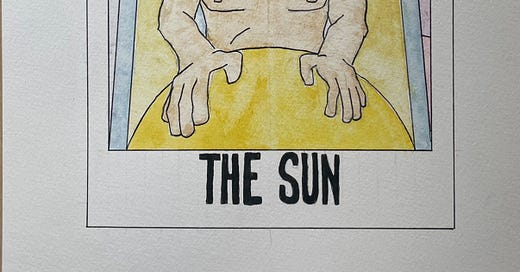


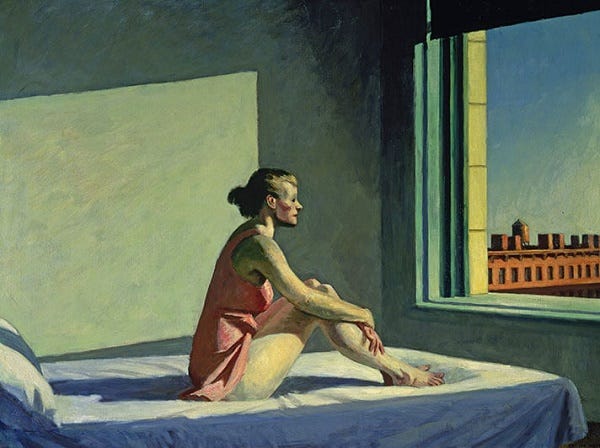
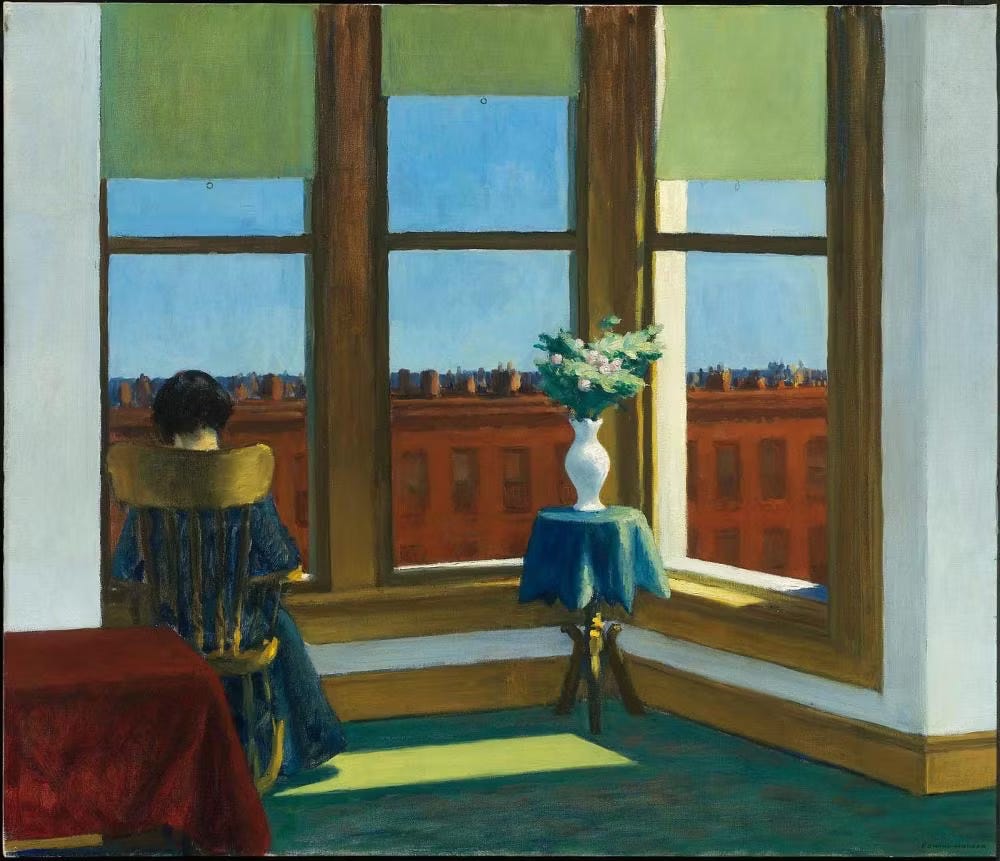
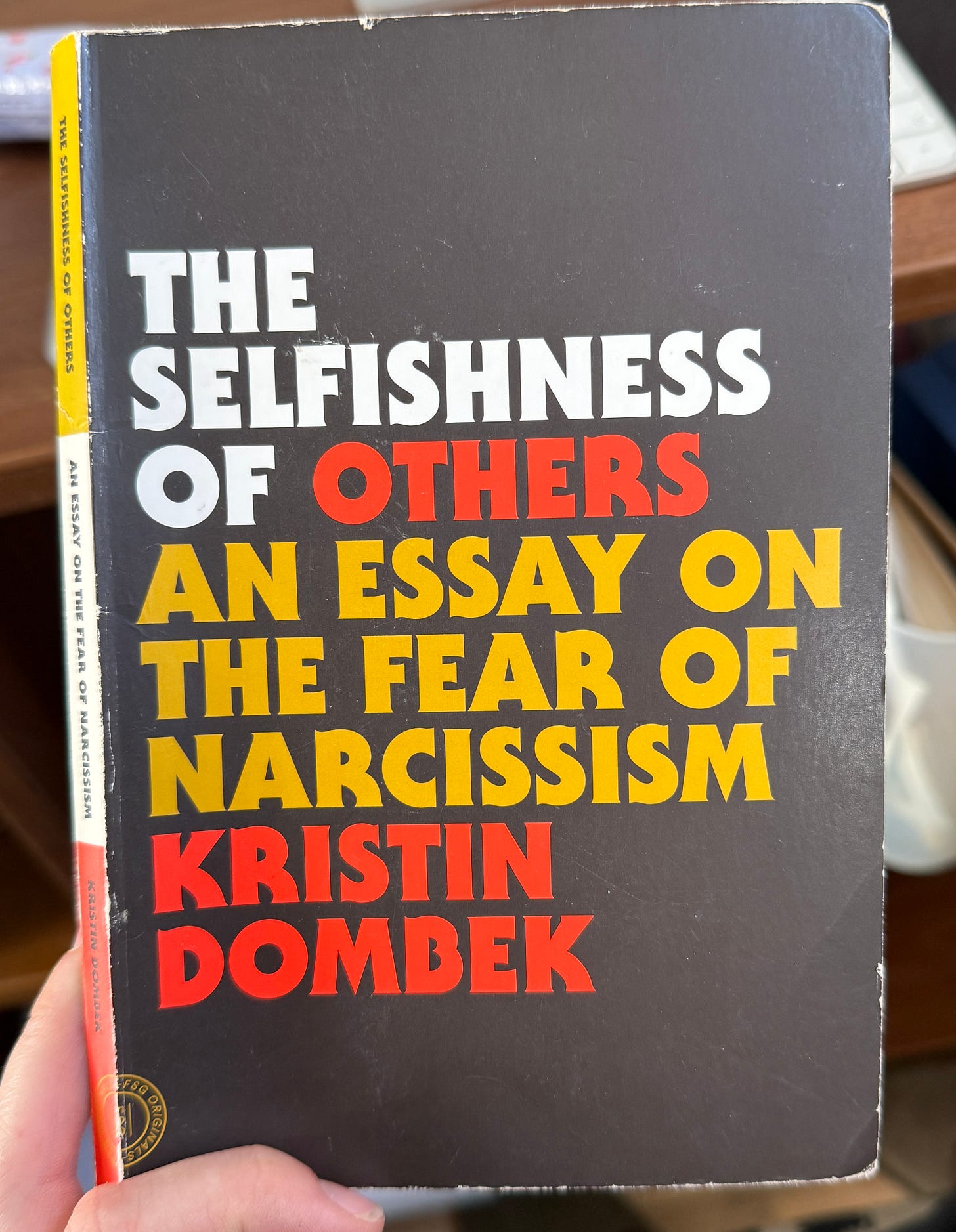
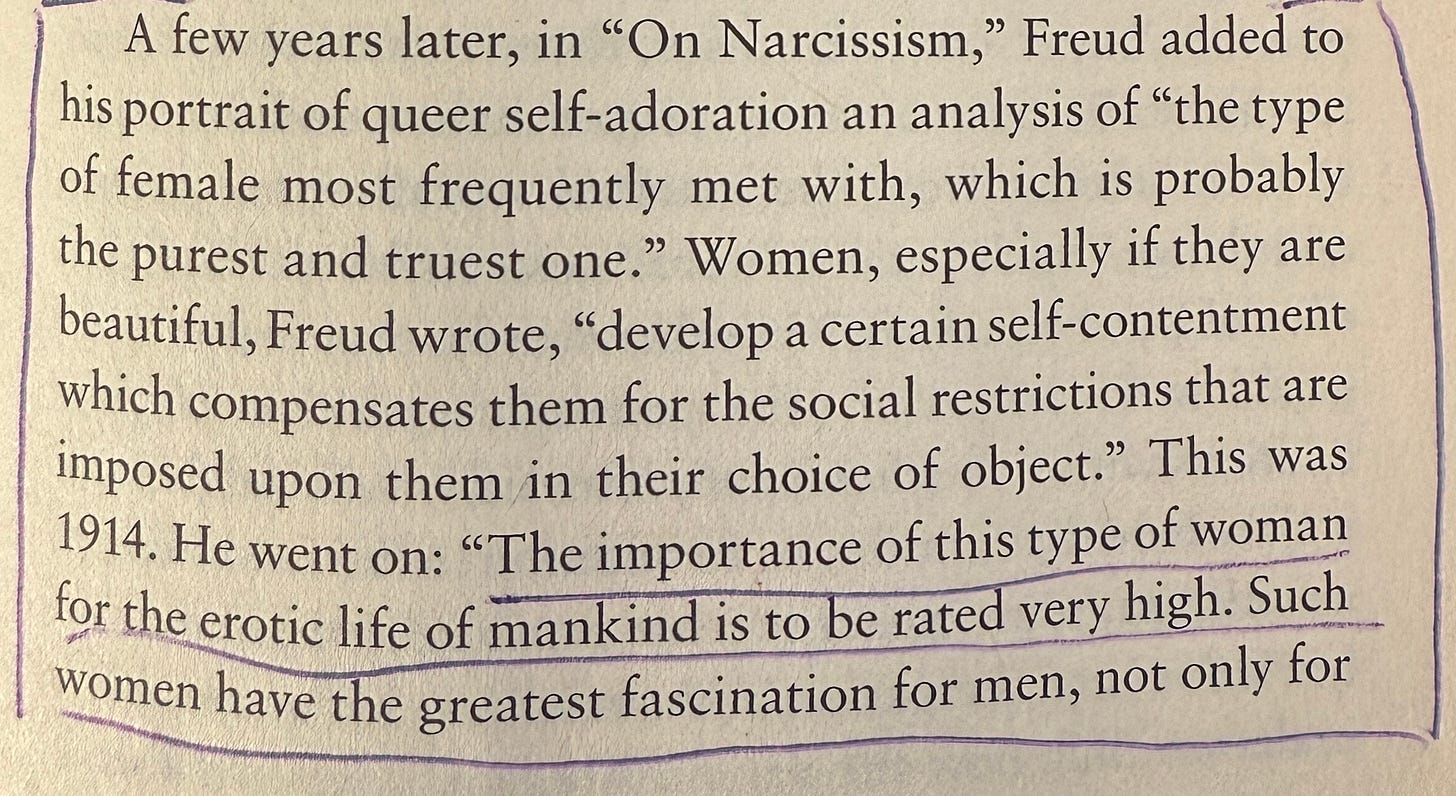
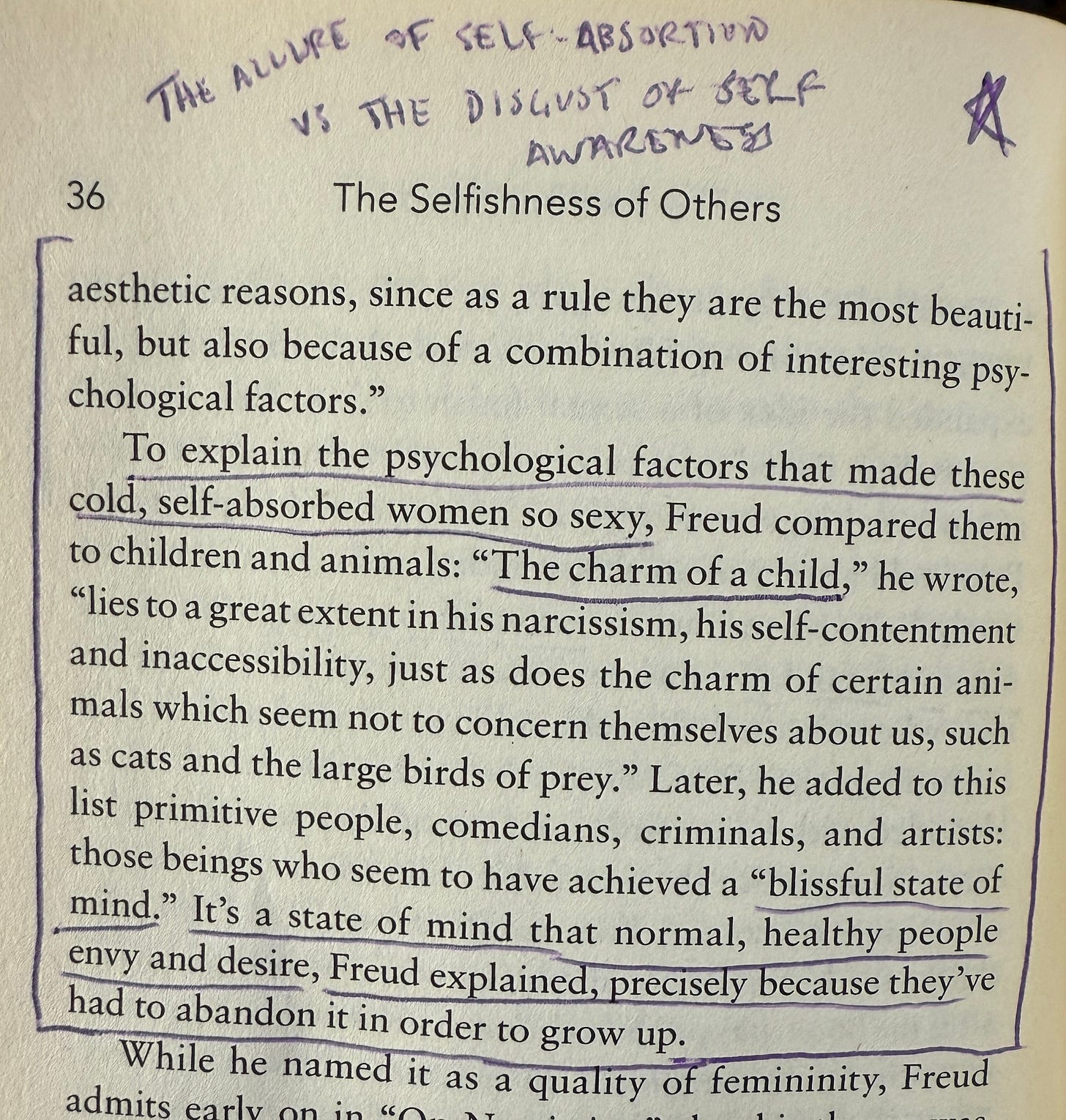
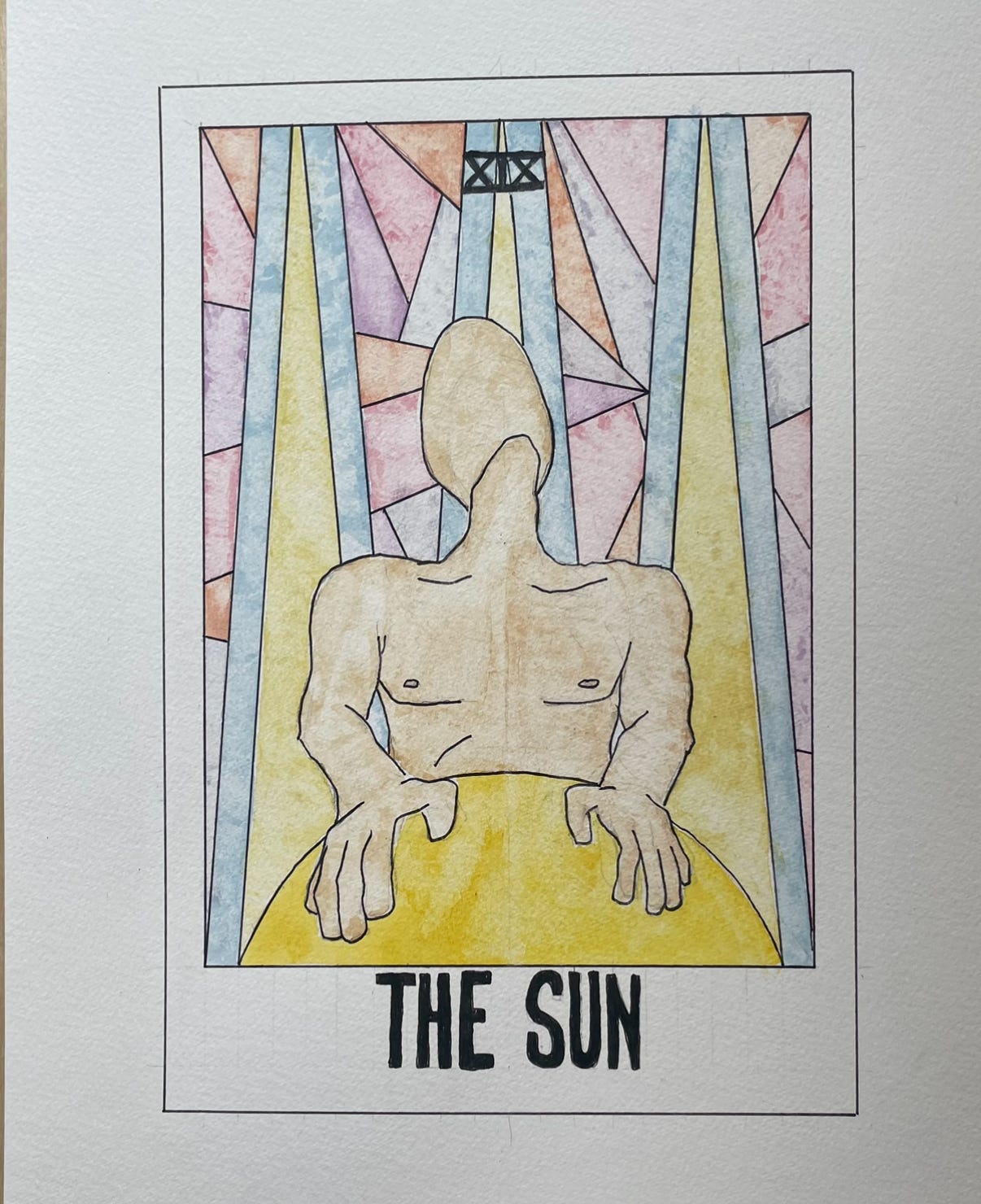
I love your writing and would read a book of yours.
Well, here goes nothing…
I attended the Songwriting course. It was fascinating - thank you Laura. If anyone is thinking of doing this on catchup (or perhaps another of the School of Songs [SoS] courses live) I can very highly recommend it.
I’m (of course) a fan and also a beginning, hobbyist songwriter. That’s how I entered the course - I’ve been playing guitar for a while.
Lecture 1 was intimidating even before Laura had begun as the hosts had given us 20 minutes to write and record a ‘song’/Verse and upload it to the SoS database. We didn’t have to of course, but I wanted to ‘get the full experience’, so I did.
****
“From the Paintings” - based on one of the Hopper paintings.
They make her feel like a child
Been traipsing through their thoughts for a while
The last nights not forgotten,
Something said, little and often,
I’m not sure this will go another mile.
****
Not amazing but I was proud of myself for doing *something*.
The lecture (on Naive Songwriting) was very illuminating. My other half watched a rerun of the video (and the rest of the course) and was also captivated. Laura has such an easy, conversational, charming delivery and the topics/stories were always a treat.
At the end of the first week I’d completed my homework to write a more complete song (well a verse and a chorus in my case) upload a performance of it *and* attend a ‘song share’ where we would be put into groups (I had a group of 4) to check out and give feedback on one another's pieces. I was (of course) with experienced songwriters, so it was super-intimidating and seriously testing my anxiety levels. But again, I did it. Proud of my actions, if not my ‘art’. They were very kind.
Here it is:
****
Next Move - based on another one of the Hopper paintings.
[Verse]
A rattle of china opens the scene
Detail a-side she’s almost serene
With gaze cast to mirror,
A new notion fills her
[Pre-Chorus]
And this thought signals the change,
She now knows the next move in this game
[Chorus]
And Oooh, how it soothes her.
Oooh, it re-news her.
[Outro]
Oooh, ooh.
****
So, here I am being my childlike narcissist. Trying not to care what you may make of this (an experiment).
My adult introversion will not allow me to share the recordings. That’s far too nauseating a prospect (No!).
Horribly, I was hit with a bereavement during the rest of the course and whilst I continued to attend (and it lifted me so - thank you again, Laura) I was not in a place to write and attempt to perform.
However, I do resolve to get back to it - I can access the materials anytime.
I’ll get there soonish, I hope. I have a very cool Fender Lead II that is calling to me. And I know I can do better. Naive narcissist me just needs to give it another go.
Thanks once again for all these essays. Are we coming to the end of the Tarot series now? Or did I misunderstand one of your previous messages?